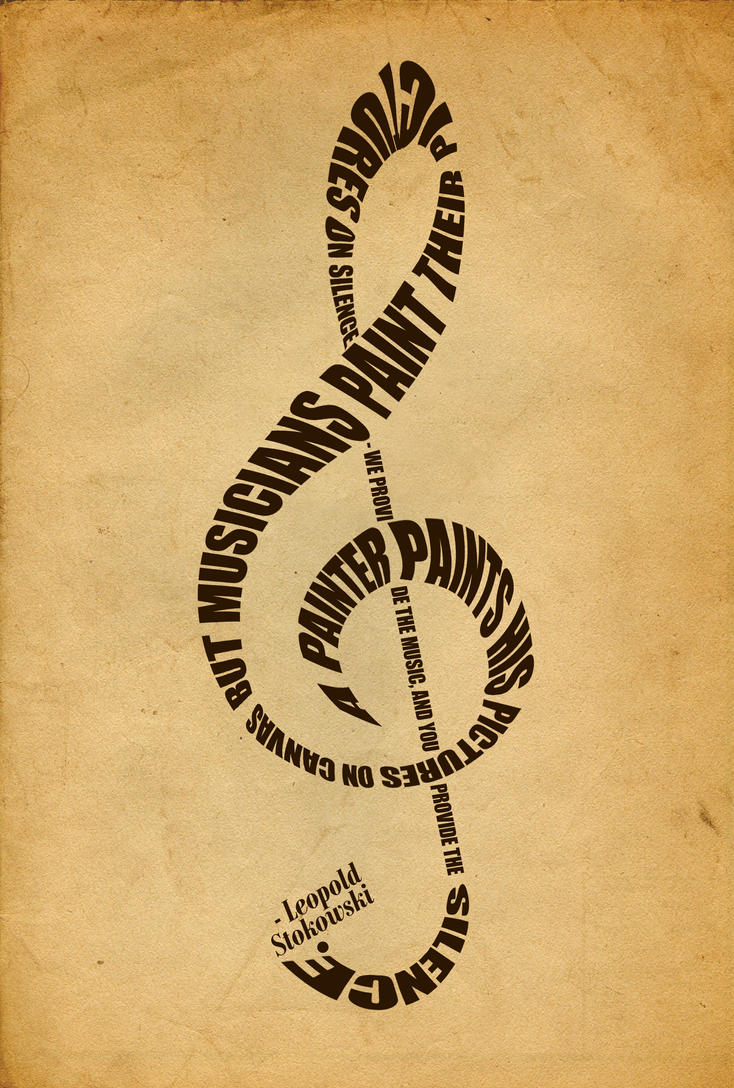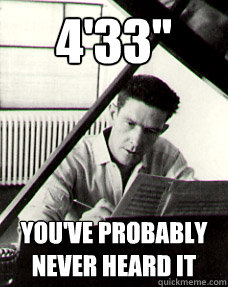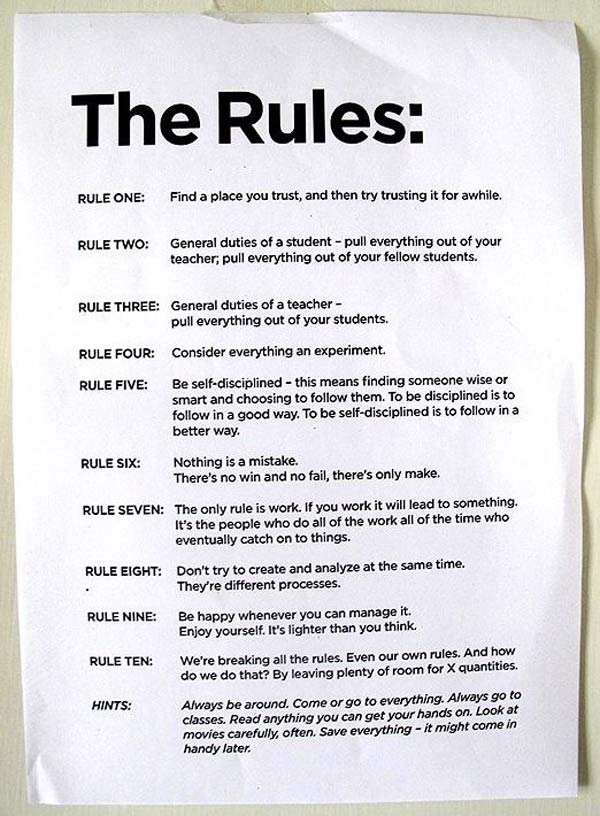WHAT IS SILENCE?
 |
| Johann Henry Fuseli: Silence, 1799-1801 |
SOME QUESTIONS TO PONDER
IS SILENCE THE ABSENCE OF SOUND?
-----
IS THERE REALLY SILENCE IN THE
ENVIRONMENT IN WHICH WE LIVE?
If the room were completely silent for 5 minutes how many
ambient sounds or background sounds would be heard?
WHAT IS SOUND?
-----
WHAT IS NOISE?
-----
IS THERE ANY DIFFERENCE
BETWEEN SOUND AND NOISE?
"Noise is a nomad;
sound has a destination."
~Haroon Mirza (English artist, b. 1978)~
IS SILENCE HEARD OR LISTENED TO?
-----
WHAT IS THE DIFFERENCE BETWEEN
HEARING AND LISTENING?
"To listen is an effort,
and just to hear is no merit.
A duck hears also."
~Igor Stravinsky (Russian-born modern composer, 1882-1971)~
WHY IS SILENCE IMPORTANT IN THE
PERFORMANCE OF A MUSIC PIECE?
-----
WHY IS SILENCE IMPORTANT TO THE
MUSICIANS IN THE ORCHESTRA?
----
WHY IS SILENCE IMPORTANT TO THE AUDIENCE?
-----
HOW DOES THE CONDUCTOR COMMUNICATE
TO PERFORMERS WITHOUT SPEAKING?
-----
WHAT IS BODY LANGUAGE?
(What are some ways of communicating
using body language?)
IS SILENCE THE ABSENCE OF SOUND?
-----
IS THERE REALLY SILENCE IN THE
ENVIRONMENT IN WHICH WE LIVE?
If the room were completely silent for 5 minutes how many
ambient sounds or background sounds would be heard?
WHAT IS SOUND?
-----
WHAT IS NOISE?
-----
IS THERE ANY DIFFERENCE
BETWEEN SOUND AND NOISE?
"Noise is a nomad;
sound has a destination."
~Haroon Mirza (English artist, b. 1978)~
IS SILENCE HEARD OR LISTENED TO?
-----
WHAT IS THE DIFFERENCE BETWEEN
HEARING AND LISTENING?
"To listen is an effort,
and just to hear is no merit.
A duck hears also."
~Igor Stravinsky (Russian-born modern composer, 1882-1971)~
WHY IS SILENCE IMPORTANT IN THE
PERFORMANCE OF A MUSIC PIECE?
-----
WHY IS SILENCE IMPORTANT TO THE
MUSICIANS IN THE ORCHESTRA?
----
WHY IS SILENCE IMPORTANT TO THE AUDIENCE?
-----
HOW DOES THE CONDUCTOR COMMUNICATE
TO PERFORMERS WITHOUT SPEAKING?
-----
WHAT IS BODY LANGUAGE?
(What are some ways of communicating
using body language?)
"A painter paints his
pictures on canvas.
But musicians paint
their pictures on silence.
We provide the music,
and you provide the silence."
~Leopold Stokowski (British orchestra conductor, 1882-1977)~
pictures on canvas.
But musicians paint
their pictures on silence.
We provide the music,
and you provide the silence."
~Leopold Stokowski (British orchestra conductor, 1882-1977)~

WHAT IS THE ROLE SILENCE PLAYS
IN A MUSICAL COMPOSITION?
-----
WHAT DOES SILENCE DO TO THE SOUNDS
IN A MUSICAL COMPOSITION?
-----
HOW IMPORTANT IS SILENCE TO
THE RHYTHM OF A PIECE?
-----
HOW DOES A COMPOSER USE
SILENCE TO CREATE EMOTION?
-----
CAN SILENCE BE SEEN
IN A PERFORMANCE?
-----
CAN SILENCE BE FELT?
"Music is the Silence
between the notes"
-----
WHAT DOES SILENCE DO TO THE SOUNDS
IN A MUSICAL COMPOSITION?
-----
HOW IMPORTANT IS SILENCE TO
THE RHYTHM OF A PIECE?
-----
HOW DOES A COMPOSER USE
SILENCE TO CREATE EMOTION?
-----
CAN SILENCE BE SEEN
IN A PERFORMANCE?
-----
CAN SILENCE BE FELT?
"Music is the Silence
between the notes"
.png) |
| TheColorMusicCompany.com |
~Claude Debussy (French impressionist composer, 1862-1918)~
HOW DOES SILENCE HELP US IN EVERYDAY LIFE?
-----
IS SILENCE A FORM OF COMMUNICATION?
-----
WHAT TYPES OF COMMUNICATIONS
ARE DONE THROUGH SILENCE?
-----
IS SILENCE A NEED FOR EVERYONE?
"Even silence speaks."
~Hausa Proberb~
-----
IS SILENCE A FORM OF COMMUNICATION?
-----
WHAT TYPES OF COMMUNICATIONS
ARE DONE THROUGH SILENCE?
-----
IS SILENCE A NEED FOR EVERYONE?
"Even silence speaks."
~Hausa Proberb~
-----
"Music and silence combine strongly
because music is done with silence,
and silence is full of music."
~Marcel Marceau (French minme, 1923-2007)~
-----
"Music and silence combine strongly
because music is done with silence,
and silence is full of music."
~Marcel Marceau (French minme, 1923-2007)~
-----
SILENCE
Marcel Marceau and Victor Borge
https://www.youtube.com/watch?v=HlDDMmerHAo
HOW WOULD YOU DEFINE THE PROPER USE
OF SILENCE IN A CLASSROOM SETTING?
-----
WHY IS SILENCE NEEDED IN THE CLASSROOM?
Silence is the relative or total lack of audible sound. By analogy,
the word silence may also refer to any absence of communication,
even in media other than speech. Silence is also used as total
communication, in reference to non verbal communication and
spiritual connection. Silence is also referred to no sounds uttered
by anybody in a room and or area. Silence is a very important
factor in many cultural spectacles, as in rituals.
-----
Music inherently depends on silence in some form or another to
distinguish other periods of sound and allow dynamics, melodies
and rhythms to have greater impact. For example, most music
scores feature rests denoting periods of silence.
-----
Some composers take the use of silence in music to an extreme.
4′33″ is an experimental musical work by avant-garde composer
John Cage
OF SILENCE IN A CLASSROOM SETTING?
-----
WHY IS SILENCE NEEDED IN THE CLASSROOM?
Silence is the relative or total lack of audible sound. By analogy,
the word silence may also refer to any absence of communication,
even in media other than speech. Silence is also used as total
communication, in reference to non verbal communication and
spiritual connection. Silence is also referred to no sounds uttered
by anybody in a room and or area. Silence is a very important
factor in many cultural spectacles, as in rituals.
-----
Music inherently depends on silence in some form or another to
distinguish other periods of sound and allow dynamics, melodies
and rhythms to have greater impact. For example, most music
scores feature rests denoting periods of silence.
-----
Some composers take the use of silence in music to an extreme.
4′33″ is an experimental musical work by avant-garde composer
John Cage
Though first performed on the piano, the piece was composed for
any instrument or instruments and is structured in three movements.
The length of each movement is not fixed by the composer, but the
total length of the combination of three movements is.
http://en.wikipedia.org/wiki/Silence
any instrument or instruments and is structured in three movements.
The length of each movement is not fixed by the composer, but the
total length of the combination of three movements is.
http://en.wikipedia.org/wiki/Silence
John Cage About Silence
What is Silence?
Silence is listening
Hearing is silence
Hearing your inner self is silence
Silence is hearing those around you
Hearing nature is silence
Silence can only be heard when listening
Hearing can only be listened to by silence
Hearing when not listening can be deceiving
Silence and you will hear
John Cage

"There is no such thing as silence.
If so, what is silence?
Is silence sound?
Noise?
Music?"
http://deconstruction-in-music.com/proefschrift/300_john_cage/317_cage_and
_noise/317b_music_noise_silence_sound/music_noise_silence_sound.htm
_noise/317b_music_noise_silence_sound/music_noise_silence_sound.htm
-----
There’s no such thing as silence. What they thought was silence, because they
didn’t know how to listen, was full of accidental sounds. You could hear the
wind stirring outside during the first movement. During the second, raindrops
began pattering the roof, and during the third the people themselves made all kinds
of interesting sounds as they talked or walked out.
~John Cage speaking about the premiere of 4′33″~

There’s no such thing as silence. What they thought was silence, because they
didn’t know how to listen, was full of accidental sounds. You could hear the
wind stirring outside during the first movement. During the second, raindrops
began pattering the roof, and during the third the people themselves made all kinds
of interesting sounds as they talked or walked out.
~John Cage speaking about the premiere of 4′33″~

4'33'' for Orchestra
(1952)
Laurence Foster, Conductor
4'33" is a three-movement composition by American experimental
composer John Cage (1912–1992). It was composed in 1952
for any instrument (or combination of instruments), and the
score instructs the performer not to play the instrument during
the entire duration of the piece throughout the three movements
(which, for the first performance, were divided into thirty seconds
for the first, two minutes and twenty-three seconds for the second
and one minute and forty seconds for the third). The piece
purports to consist of the sounds of the environment that the
listeners hear while it is performed, although it is commonly
perceived as "four minutes thirty-three seconds of silence."
4'33'' for Piano
(1952)
Armin Fuchs, Piano
1. tacet
2. tacet
3. tacet
4′33″ is Cage's most famous and most controversial composition, and by
far the best-known of the numerous musical works that consist mainly of silence.

4′33″ is an example of automaticism. Since the Romantic Era composers have
been striving to produce music that could be separated from any social
connections, transcending the boundaries of time and space. In automaticism,
composers wish to completely remove both the composers and the artist from
the process of creation. This is motivated by the belief that creation without
social pressure is impossible, there is no way for us to truly express ourselves
without infusing the art with the social standards that we have been subjected
to since birth. Therefore, the only way to achieve truth is to remove the artist
from the process of creation. Cage achieves that by employing chance to make
compositional decisions. In 4′33″, neither artist nor composer has any impact
on the piece, Cage has no way of controlling what ambient sounds will be
heard by the audience. 4′33″ challenges, or rather exploits to a radical extent,
the social regiments of the modern concert life etiquette, experimenting
on unsuspecting concert-goers to prove an important point.

First, the choice of a prestigious venue and the social status of the composer
and the performers automatically heightens audience's expectations for the
piece. As a result, the listener is more focused, giving Cage's 4′33″ the same
amount of attention (or perhaps even more) as if it were Beethoven's 9th. Thus,
even before the performance, the reception of the work is already predetermined
by the social setup of the concert. Furthermore, the audience's behavior is
limited by the rules and regulation of the concert hall; they will quietly sit and
listen to 4′33” of ambient noise. It is not easy to get a large group of people to
listen to ambient for nearly five minutes; unless they are regulated by the
concert hall etiquette.

The second point made by 4′33″ concerns duration. According to Cage, duration
is the essential building block of all of music. This distinction is motivated by the
fact that duration is the only element shared by both silence and sound. As a
result, the underlying structure of any musical piece consists of an organized
sequence of time buckets.[23] They could be filled with either sounds, silence
or noise; where neither of these elements is absolutely necessary for
completeness. In the spirit of his teacher Schoenberg, Cage managed to
emancipate the silence and the noise to make it acceptable or perhaps even
integral part of his music composition. 4′33″ serves as a radical and extreme
illustration of this concept, if the time buckets are only necessary parts of the
musical composition then what stops the composer from filling them with no
intentional sounds?

The third point is that the work of music is defined not only by its content but
also by the behavior it elicits from the audience. In the case of Stravinsky's
Rite of Spring this would consist of widespread dissatisfaction leading up to
violent riots. In Cage's4′33″, the audience felt cheated by having to listen to
no composed sounds from the performer. Nevertheless, in 4′33″ the audience
contributed the bulk of the musical material of the piece. Since the piece
consists of exclusively ambient noise, the audience's behavior, their whispers
and movements, are essential elements that fill the above-mentioned
time buckets.
http://en.wikipedia.org/wiki/4%E2%80%B233%E2%80%B3
is the essential building block of all of music. This distinction is motivated by the
fact that duration is the only element shared by both silence and sound. As a
result, the underlying structure of any musical piece consists of an organized
sequence of time buckets.[23] They could be filled with either sounds, silence
or noise; where neither of these elements is absolutely necessary for
completeness. In the spirit of his teacher Schoenberg, Cage managed to
emancipate the silence and the noise to make it acceptable or perhaps even
integral part of his music composition. 4′33″ serves as a radical and extreme
illustration of this concept, if the time buckets are only necessary parts of the
musical composition then what stops the composer from filling them with no
intentional sounds?

The third point is that the work of music is defined not only by its content but
also by the behavior it elicits from the audience. In the case of Stravinsky's
Rite of Spring this would consist of widespread dissatisfaction leading up to
violent riots. In Cage's4′33″, the audience felt cheated by having to listen to
no composed sounds from the performer. Nevertheless, in 4′33″ the audience
contributed the bulk of the musical material of the piece. Since the piece
consists of exclusively ambient noise, the audience's behavior, their whispers
and movements, are essential elements that fill the above-mentioned
time buckets.
http://en.wikipedia.org/wiki/4%E2%80%B233%E2%80%B3
John Cage on the Game Show
"What's My Line"
MORE QUOTATIONS
ABOUT SILENCE
 |
| Lucien Levy-Dhurmer:
Silence, 1895
|

Silence is a source
of great strength.
~Lao Tzu~
------
------
I have often lamented
that we cannot close our ears
with as much ease as we can our eyes.
~Richard Steele~
-----
-----
Silence is a sounding thing,
to one who listens hungrily.
~Gwendolyn Bennett~
-----
-----
One of the greatest sounds of them all,
and to me it is a sound,
is utter, complete silence.
~André Kostelanetz~
-----
-----
Be silent or let the words
be worth more than silence.
~Pythagoras~
-----
-----
Silence
is the ultimate weapon
of power
~Charles deGaulle~
-----
-----
Nothing strengthens authority
so much as silence
~Leonardo daVinci~
-----
-----
Silence is as deep as eternity;
speech, shallow as time.
~Thomas Carlyle~
-----
-----
You hesitate to stab me with a word,
and know not -
silence is the sharper sword.
silence is the sharper sword.
~Samuel Johnson~
-----
-----
To silence another,
first be silent yourself.
~Latin Proverb~
-----
Silence is exhilarating at first -
-----
Silence is exhilarating at first -
as noise is -
but there is a sweetness to silence
outlasting exhilaration,
akin to the sweetness of listening
and the velvet of sleep.
~Edward Hoagland~
-----
-----
Nothing is more useful than silence.
~Menander of Athens~
-----
-----
Silence is a fence around wisdom.
~German Proverb~
-----
-----
He who does not understand your silence
will probably not understand your words.
~Elbert Hubbard~
-----
-----
Silence is more musical than any song.
~Christina Rossetti~
-----
-----
Nowadays most men lead lives
of noisy desperation.
~James Thurber~
-----
-----
We must have reasons for speech
but we need none for silence.
~Proverb~
-----
-----
Silence is the most perfect
expression of scorn.
~George Bernard Shaw~
-----
-----
Let us be silent,
that we may hear
the whispers of the gods.
~Ralph Waldo Emerson~
-----
-----
Silence is the true friend
that never betrays.
~Confucius~
-----
In order to see birds
-----
In order to see birds
it is necessary to become
a part of the silence.
~Robert Lynd~
-----
The best answer to anger is silence.
-----
The best answer to anger is silence.
~Author Unknown~
-----
-----
Silence is the mother of truth.
~Benjamin Disraeli~
-----
-----
Her hearing was keener than his,
and she heard silences
he was unaware of.
~D.M. Thomas~
-----
~D.M. Thomas~
-----
There are times when silence
has the loudest voice.
~Leroy Brownlow~
-----
-----
Silence is one of the
hardest arguments to refute.
~Josh Billings~
-----
-----
Still waters run deep.
~English Proverb~
Silence is also speech.
~Proverb~
-----
-----
Words can make a deeper scar
than silence can heal.
~Author Unknown~
-----
-----
Spiteful words can hurt your feelings
but silence breaks your heart.
~Author Unknown~
-----
-----
To be an artist,
you need to exist
in a world of silence.
~Louise Bourgeois~
-----
-----
I go silent so I can write.
When my tongue is wagging
my fingers are silent.
~Sonia Rumzi~
-----
-----
Silence is a sounding thing,
to one who listens hungrily.
~Gwendolyn Bennett~
-----
-----
The ideal man is his own best friend
and takes delight in privacy.
~Aristotle~
-----
-----
It is as important to cultivate
your silence power
as your word power.
~William James~
-----
-----
We will remember
not the words of our enemies,
but the silence of our friends.
~Martin Luther King, Jr~
-----
~Martin Luther King, Jr~
-----
The real art of conversation
is not only to say the right thing
at the right place
but to leave unsaid
the wrong thing
at the tempting moment.
~Dorothy Nevill~
-----
-----
To silence another,
first be silent yourself.
first be silent yourself.
~Latin Proverb~
-----
Say nothing
-----
Say nothing
sometimes says the most.
~Emily Dickinson~
-----
-----
After silence,
that which comes nearest
to expressing
the inexpressible
is music.
is music.
~Aldous Huxley~
-----
-----
The most profound statements
are often said in silence.
~Lynn Johnston~
-----
-----
Spiteful words can hurt your feelings
but silence breaks your heart.
~Author Unknown~
-----
-----
Silence is the genius of fools
and one of the virtues of the wise.
~Author Unknown~
-----
-----
To be silent often is to learn.
~Edward Counsel~
http://www.quotegarden.com/silence.html
http://injuredlamb.hubpages.com/hub/Silence-quotes
http://www.quotegarden.com/silence.html
http://injuredlamb.hubpages.com/hub/Silence-quotes
 |
| Redon: Silence |
FIRST DAY DIRECTIONS CONCERNING
BODY LANGUAGE AND SILENCE






